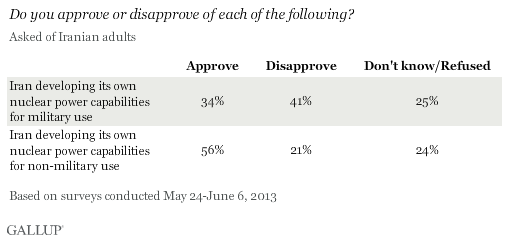WASHINGTON, D.C. -- As Iranian President Hassan Rouhani's recent diplomatic overtures raise the possibility of rapprochement between the U.S. and Iran, recent Gallup data show Iranians are divided on one of the major issues keeping these countries apart: the country's nuclear program. Though a majority of Iranians approve of their government developing nuclear capabilities for non-military use, fewer approve of their country developing these capabilities for military use, which Iran has repeatedly denied doing. A plurality of Iranians disapprove of developing nuclear abilities for military use.

The much-anticipated meeting Tuesday between Iran's negotiators and the "P5+1" group, which is composed of the five permanent members of the U.N. Security Council plus Germany, will be an important moment in determining the likelihood of a true breakthrough in talks. The P5+1 group has asked Iran to stop enriching uranium to a level of 20% and increase international monitoring of its program in exchange for gradually removing sanctions that are damaging the country's economy and major institutions.
Many Iranians would likely welcome an end to the diplomatic standoff between their country and many of the world's top powers over Iran's nuclear program. Even before Rouhani's election, the majority of Iranians were at least somewhat hopeful about the possibility of their country reaching an agreement with the European Union on Tehran's nuclear program.

Bottom Line
Despite the considerable difficulties facing negotiators on both sides on Tuesday, Iranians are cautiously optimistic that their country will eventually reach a diplomatic settlement with Western nations. The recent dialogue between U.S. President Barack Obama and Rouhani has simultaneously raised hopes among those pushing for sanctions relief and sounded an alarm among some traditional U.S. allies in the Middle East and North Africa (MENA) region. While its nuclear program remains the major point of contention between Tehran and the international community, Iran's role in supporting Hezbollah, the regime in Syria, and its role in Iraq could be among the issues Washington aims to discuss with Iran's newly elected president.
As the economic pressure resulting from sanctions increases, Iranians' suffering could continue to increase, putting political pressure on the leadership in Tehran to reach a breakthrough. For Obama, a negotiated settlement with Iran would complete a goal he set during his 2008 presidential campaign and would be a landmark in a transnational relationship that has been contentious for generations. Such an accomplishment would have significant ramifications for geopolitical realties in the MENA region and create a lasting legacy for the Obama administration.
For complete data sets or custom research from the more than 150 countries Gallup continually surveys, please contact us.
Survey Methods
Results are based on telephone interviews with 1,000 adults, aged 15 and older, conducted in May 24-June 6, 2013, in Iran. For results based on the total sample of national adults, one can say with 95% confidence that the maximum margin of sampling error is ± 4 percentage points. The margin of error reflects the influence of data weighting. In addition to sampling error, question wording and practical difficulties in conducting surveys can introduce error or bias into the findings of public opinion polls.
For more complete methodology and specific survey dates, please review Gallup's Country Data Set details.
